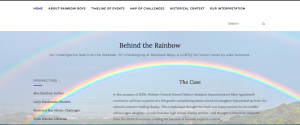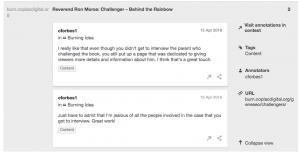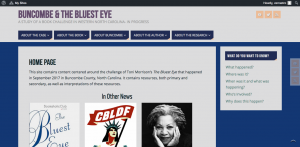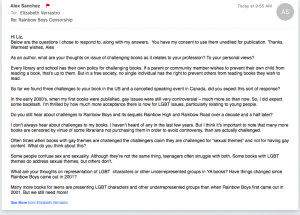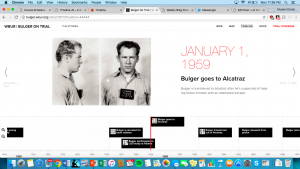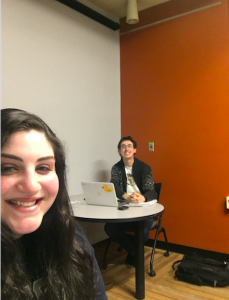Though I felt confident before today, after Sean and I’s successful presentation of our website, I feel even more confident in my defense of our contract. At the completion of the course, I believe we met all, and exceeded some, of the goals we outlined for ourselves when we first created the project contract.
When it comes to the mission statement, I felt it was very important we make it a central part of our project to not only demonstrate all sides of the case, but also provide perspectives from people who aren’t often featured in censorship cases: the students and the school faculty. This was thoroughly accomplished through our interviews with Trish Warren and Carly Maldonado, as they both represent distinct points of view I felt were not often represented in popular media’s coverage of censorship cases. Though I was in touch with the teacher we wanted to interview, Carole Barnabas, and she agreed to answering questions, she never got back to us, despite my reaching out. I think we were successful in our portrayal of the case and those involved without her direct input, though Furthermore, we were able to give a well-rounded view of the case with the Alex Sanchez interview and our page dedicated to Rev. Morse. Though we were not able to get in touch with him, I think we represented his views to the best of our ability and gave context to why he might have objected to the book and challenged it. I’m proud of our ability to demonstrate how censorship cases often involve far more people than just the challenger and their student.
As far as our process goes involving the tools we used, I think we were able to utilize a vast about of resources to produce our project according to our contract. WordPress’s theme Activello was great in the final production of our project because it allowed for a search bar and two separate navigation sections, including a left sided one, that fit the design we had envisioned earlier in the semester. Coggle and Google Docs were key in allowing me and Sean to share ideas and give feedback to each other, especially when we were not able to meet in person. We felt these organizational tools really helped us plan and carry out Behind the Rainbow. Similarly, we were able to successfully incorporate an interactive timeline and map using Timeline JS and StoryMap JS, which we found to enrich our site even more. We similarly incorporated elements that went outside of the class requirements through our use of the SUNY Geneseo online academic databases and YouTube. We were able to use an academic article written about Rainbow Boys to demonstrate the issues with the novel from the left and YouTube to demonstrate Sanchez’s commitment to bettering LGBT life.
When it came to the Milestones, I think we strove to meet our plan, but as Rebecca always reminds us, we can’t control other people, so some of the interviews and related content were delayed. I think the milestones enhanced our ability to design our project effectively because sometimes it felt like we had so much to do, but I would be able to look at the project contract and focus myself on a specific part of the website for that week.
Finally, when it comes to the division of labor, I couldn’t have asked for a better partner than Sean. We were able to both contribute equally to website, and a big part of that was because we were able to work together and weren’t afraid to ask for help when we needed it. We pretty much stuck to our assigned content, but were able to edit and clarify each other’s sections, which was another way to augment our website.
Overall, I’m so proud of what we’ve accomplished and I’m pretty sure I’m going to be showing off our website for years to come.
